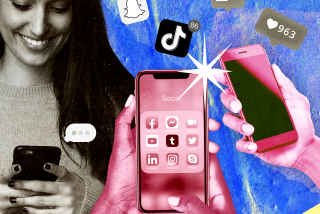Poll shows technology doubts
- Share via
In this gadgety nation enamored of tech toys and i-everything, to plug in is to simplify our hectic daily lives as we digitally, and literally, connect with the world beyond our front doors. So the modern-day wisdom goes.
If you’re not riding this pixilated wave? Well, you stand in the obsolete minority. Right? Actually, wrong. Turns out modern-day wisdom isn’t always so wise. Almost half of all American adults report they keep information gadgetry on the periphery, using it only “occasionally,” and with many characterizing technology as a “hassle,” according to a study released in May by the Pew Internet & American Life Project.
It’s a surprising figure, one that even threw John B. Horrigan, associate director for research at Pew. “I didn’t think it would be that big,” says Horrigan. “[It tells us] we’re really not that far along as a society in integrating these technologies into our lives. When you have about half of the adult population being tepid users
True, 73% of Americans have cellphones. But only 41% use the text-message function. Another 68% have desktop computers, but only 11% create Web pages or blogs. About 20% own an iPod or MP3 player. And 11% have a BlackBerry or similar personal digital assistant.
The Pew study breaks users into three main groups -- the 49% occasional users, 20% who are “middle-of-the-road” and 31% who are the “elite tech users.” Within those groups, the study identifies 10 subgroups based on usage and attitude.
At one end are the “omnivores” -- the 8% identified as having the most information gadgets and services, and who use them “voraciously.” At the other end are the 15% who are completely “off the network” -- a group that tends to be older and is content with their generation’s media.
In between, you’ll find “lackluster veterans,” the 8% who are frequent Internet users less interested in cellphones and overall not too thrilled about technology; and the 11% labeled “indifferents” -- users who have cellphones or online access but use them intermittently and find connectivity “annoying.”
Another 10% are “connected but hassled.”
“That’s a group that’s fairly wired in terms of technology, but they find it intrusive and suffer from information overload,” says Horrigan. “So it’s interesting to see that paradox of opening the spigot of information, but then finding it to be a burden.”
“We’re in a period of great change when it comes to the uses of information technology. For better or worse, these developments are news.... And it builds the notion that everybody’s doing this, when in fact some people are -- but a lot of people aren’t,” he says.






